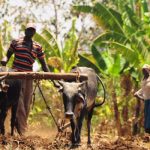Agroecology – the bold future of farming in Africa
Delegates of the Alliance for Food Sovereignty in Africa (AFSA) are converging on a high-level UN meeting in Rome, Italy, to beat the drum for Agroecology in Africa. The delegation is representing the concerns and interests of small-scale farmers and food producers, fisherfolk, pastoralists, indigenous peoples, faith-based organizations, youth and women groups, and consumer networks from 50 countries at the UN Food and Agriculture Organization’s International Symposium on Agroecology from 3-5 April at the UN HQ.
After many decades of investment, the global community must surely recognize that industrial agriculture is a dead end. It claims to have raised yields in places but has done so at great cost, with extensive soil damage, huge biodiversity loss and negative impacts on nutrition, cultural values, food sovereignty and natural resources. Industrial agriculture has locked farmers into a path where external inputs are a must and undermined their resilience, particularly to climate change.
AFSA is calling for no less than a complete transformation of our agricultural and food systems. The progressive transition to agroecology offers a huge potential to feed the continent, to lift those in need out of poverty, to improve the environment, and ensure people have healthy, nutritious and culturally appropriate food.
Agroecology is taking off worldwide. “There is a wealth of evidence emerging from around the world that agroecology works,” says Dr. Million Belay, Coordinator of the Alliance for Food Sovereignty in Africa.
Agroecology is diverse – like nature. It’s productive – doubling yields in just a few years. It’s resilient to climate change, and puts carbon back in the ground. It’s efficient – recycling resources, needing less inputs, creating less waste. It’s culturally appropriate – generating local innovations and solutions.
AFSA calls upon governments and development partners to invest in agroecology, to switch financial support from expensive and unsustainable input subsidies towards agroecological solutions, to research and explore this holistic and circular approach to rural economic development, to get behind the small scale farmers who are the backbone of African food systems. Decision makers are called to recognize the ability of agroecology to diversify livelihoods and defend the dignity of farmers – so many of them women, to empower farmers to revive their soils and lands, and build resilient communities, to value indigenous knowledge while meeting the nutritional, cultural and spiritual needs of Africa’s people.
AFSA calls on the research community and academia to switch their expertise to the study of ecological solutions, and to institutionalise agroecology in educational curricula.
At this high-level UN event, AFSA will launch a new policy report entitled: A Study of Policies, Frameworks and Mechanisms Related to Agroecology and Sustainable Food Systems in Africa. The report concludes that many agriculture policies in Africa were driven by donor influence and multinational corporations pushing for intensive use of chemical fertilizers, hybrid seeds and pesticides. Chairperson Mariann Bassey-Orovwuje explains AFSA’s position, “We are dedicated to the cause of developing Africa in harmony with nature, harnessing its traditional knowledge and systems, with our people in control of our resources and related decisions.”
AFSA will also launch a 4-minute animated video on Agroecology for Africa making the case for Agroecology from an African perspective.
###
About Our Organization
Launched in 2011, the Alliance for Food Sovereignty in Africa (AFSA) is a broad alliance of civil society actors who are part of the struggle for food sovereignty and agroecology in Africa. These include African farmers’ organizations, African NGO networks, specialist African NGOs, consumer movements in Africa, international organizations which support the stance of AFSA, and individuals. Its members represent smallholder farmers, pastoralists, fisherfolk, hunter/gatherers, indigenous peoples, faith-based institutions, and consumers across Africa. It is a network of networks, currently with 33 member networks active in more than 50 African countries.
AFSA is a Pan African platform working to influence policies and promote African solutions for food sovereignty. AFSA serves as a continental platform for consolidation of issues relating to food sovereignty, and provides a single and loud voice offering clear workable solutions.
See more at www.afsafrica.org
For further information or interviews please contact:
Dr. Million Belay – AFSA Coordinator
Email: million.belay@afsafrica.org, afsa@afsafrica.org
Alliance for Food Sovereignty in Africa
Web: www.afsafrica.org
Twitter: @afsafrica
Facebook: https://web.facebook.com/AFSA-259091940943647/
Download a copy of the press release here

































